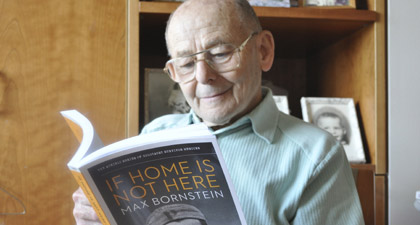Max Bornstein’s memoir reaches far beyond his horrific experiences during the Holocaust.
The 90-year-old’s book, If Home Is Not Here, covers more than 20 years, from his birth in Warsaw in 1922 through displacement, poverty, institutionalization, antisemitism and state violence.
In an interview at the Baycrest Apotex Centre, where he has been a resident for four years, the sprightly and articulate survivor exudes joie de vivre and optimism.
Despite the disastrous odyssey of his early years, Bornstein speaks of the positive restructuring of his life in Canada –meeting his wife Minnie in Toronto, who died three years ago after 61 years of marriage, and the joy of his family, daughter Linda Warman, son Jeffrey Bornstein, two grandchildren and three great-grandchildren.
When he was three months old, his family fled Poland to Berlin and then Paris so that his father could avoid the Polish army.
Two years later, Max and his pregnant mother left for Canada to be with their family in Winnipeg. As an undocumented person, his father could not legally travel to Canada.
Engulfed in poverty, Max and his sister, who was born in Winnipeg, were placed in an orphanage, where he said he was plagued by loneliness.
Disregarding all advice, his mother and the children returned to Paris in 1933 when Max was 12 years old, just as Adolf Hitler was coming to power in Europe.
When his family realized what was happening in Europe, they applied to return to Canada, but Canada had closed its doors to Jewish immigration.
Argentina accepted immigrants. His parents and sister left for Argentina, but Max was unable to leave, as he was of draft age. He was a teenager living in fear under Nazi occupation.
In his detailed memoir, he recounts his hardships and trepidations, including his mental breakdowns, unemployment and homelessness.
He also writes with humour about his episodes as a teenager developing sexual awareness and his many friendships that often gave him the strength to survive.
As the persecution of Jews increased in France, he crossed rivers and climbed mountains, finally reaching Spain. He was imprisoned by the Spanish police in three different appalling prisons and then sent to Miranda del Ebro concentration and labour camp.
In 1947, Bornstein, sponsored by his Canadian-born sister, came to Toronto. A year later, the family sponsored his parents and they were finally reunited.
“That was the most treasured reunion that I could ever recall,” he said.
Bornstein began writing his memoir in 1979 when he retired as a footwear importer. He completed his book in 1990, but had difficulty finding a publisher. He was told that there were too many books about the Holocaust.
Recently, the Holocaust Survivor Memoirs Program of the Azrieli Foundation, which supports a wide spectrum of initiatives, published If Home Is Not Here.
The Azrieli Foundation collects, publishes and distributes memoirs of Holocaust survivors.
Looking back, Bornstein said, “My childhood was completely overturned when my family escaped Poland to France.
“Nothing could have given me greater satisfaction than knowing that I am passing on the historical events and private challenges that a Jewish boy experiences and what it meant to live through such trauma.
“In passing on my knowledge to future generations,” he stressed, “what is of utmost importance is the State of Israel and what it implies to the future of maintaining our independent state.
“What other way can I avenge my people except in presenting what happened to them?”
If Home Is Not Here is available at major book stores, universities and libraries. The proceeds from the book go back to fund the programs of the Azrieli Foundation.
For more information, visit http://www.azrielifoundation.org.
